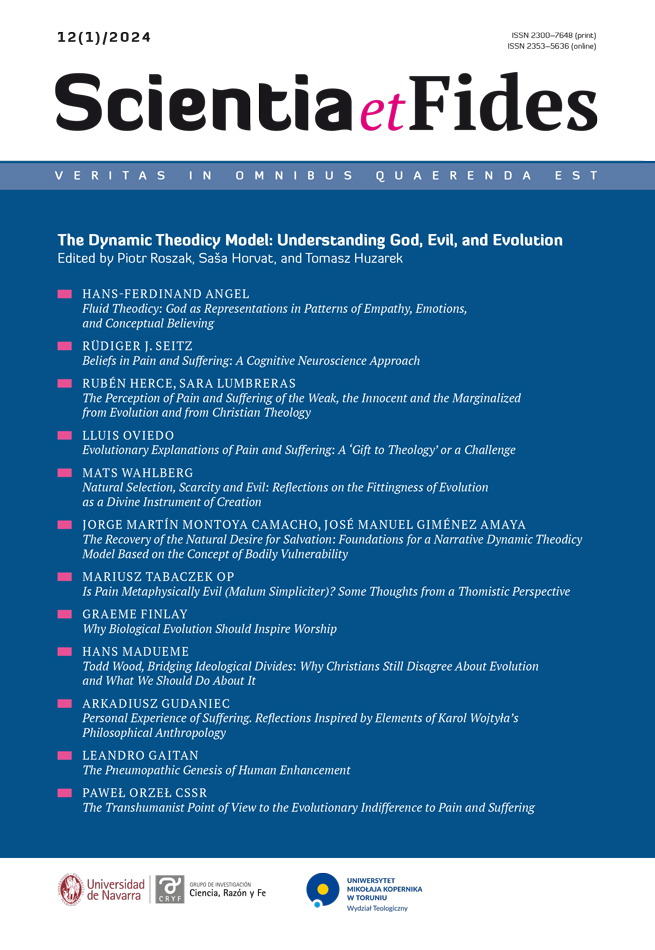The Transhumanist Point of View to the Evolutionary Indifference to Pain and Suffering
DOI:
https://doi.org/10.12775/SetF.2024.012Keywords
evolution, transhumanism, theodicy, soteriologyAbstract
The text presents a transhumanist point of view on evolution. It focuses on the lack of clear and obvious evolutionary solutions to the issue of involuntary suffering. It poses difficult questions about the possibility of enhencement of human nature and respecting the laws of evolution. It reflects on the positive role of pain for the development of individual people and the entire human species. It considers the thesis that perhaps evolution “needs” pain for proper human development. It asks whether the transition to a higher than evolutionary stage of human development, as proposed by transhumanists, will not lead to the extinction of our species? After all, it relates all this mosaic of thoughts and theories to God, who can be the answer to many posed questions.
References
Asla, Mariano. 2019. “On the limits, imperfections and evils of the human condition. Biological improvement from a thomistic perspective.” Scientia et Fides 7, no. 2: 77–95. http://dx.doi.org/10.12775/SetF.2019.017.
Bostrom, Nick. 2003. “The Transhumanist FAQ.” Accessed February 15, 2023. https://nickbostrom.com/views/transhumanist.pdf.
Cruz, Eduardo. 2015. “The evolution of human birth and transhumanist proposals of enhancement.” Zygon 50, no. 4: 830–53. http://dx.doi.org/10.13140/RG.2.1.2050.0325.
Delio, Ilia. 2020. “Suffering and Sacrifice in an Unfinished Universe: The Energy of Love.” Religions 11, no. 7: 335. https://doi.org/10.3390/rel11070335.
Franck, Juan Francisco. 2019. “The peccatum naturae and the moral condition of the will. A convergence between Aquinas and Rosmini.” Scientia et Fides 7, no. 2: 215–32. http://dx.doi.org/10.12775/SetF.2019.024.
Głąb, Anna. 2012. “Cierpię, więc jestem – problematyka teodycealna w tekstach abpa Józefa Życińskiego.” Roczniki Filozoficzne 60, no. 4: 77–99.
Howe, David. 2013. Empatia. Co to jest i dlaczego jest taka ważna. Translated by Danuta Golec. Warsaw: Oficyna Ingenium.
Ilnicki, Tomasz. 2018. “Teodycea w kontekście współczesnych osiągnięć nauk biologicznych.” Teologia i Człowiek 41, no. 1: 49–66. https://doi.org/10.12775/TiCz.2018.003.
Kałuża, Krystian. 2015. „Chrześcijańska soteriologia w obliczu wyzwań rozumu krytycznego.” Biblioteka Teologii Fundamentalnej 10: 32–68.
Kurzweil, Ray. 2013. Nadchodzi osobliwość. Kiedy człowiek przekroczy granice biologii. Translated by Eliza Chodakowska, Anna Nowosielska. Warsaw: Kurhaus Publishing.
Majewski, Marcin. 2018. Pięcioksiąg odczytany na nowo: przesłanie autora kapłańskiego (P) i jego wpływ na powstanie Pięcioksięgu. Kraków: Uniwersytet Papieski Jana Pawła II. Wydawnictwo Naukowe.
Malina, Artur. 2014. “Sprawiedliwość Syna według Listu do Hebrajczyków.” Verbum Vitae 26: 127–42.
Maul, Armand. 2007. “An Evolutionary Interpretation of the Significance of Physical Pain Experienced by Human Females: Defloration and Childbirth Pains.” Medical Hypotheses 69, no. 2: 403–09. http://dx.doi.org/10.1016/j.mehy.2007.01.005.
More, Max. 2009. “A Letter to Mother Nature.” Accessed February 15, 2023. http://strategicphilosophy.blogspot.com/2009/05/its-about-ten-years-sincei-wrote.html.
Nowicka, Justyna. 2021. “Cierpienie nie uszlachetnia?” Accessed February 15, 2023. https://misyjne.pl/justyna-nowicka-cierpienie-nie-uszlachetnia/.
Pearce, David. 1995. “The hedonistic imperative.” Accessed December 13, 2023. https://www.hedweb.com/.
Powell, Russel and Allan Buchanan. 2011. “Breaking Evolutions Chains: The Prospect of Deliberate Genetic Modification in Humans.” Journal of Medicine and Philosophy 36, no. 1: 6–27. http://dx.doi.org/10.1093/jmp/jhq057.
Radwan, Jacek. 2012. “Ewolucja zmienności genów głównego kompleksu zgodności tkankowej.” Nauka, no. 4: 155–62.
Roszak, Piotr. 2021. “Aquinas on Christ’s Will to Die and Our Salvation.” Nova et Vetera, vol. 19, no. 1 (2021): 199–216. https://doi.org/10.1353/nov.2021.0010.
Sakowski, Łukasz. 2020. “Ewolucja układu odpornościowego i co ją hamuje.” Accessed February 15, 2023. https://www.totylkoteoria.pl/ewolucja-ukladuodpornosciowego/.
Savulascu, Julian and Anders Sandberg. 2008. “Neuroenhancement of Love and Marriage – The Chemicals Between Us.” Neuroethics. no. 1: 31–44. https://doi.org/10.1007/s12152-007-9002-4.
Wagner, Michael. 2022. Interpretacje rozwoju biologii ewolucyjnej na przełomie XIX i XX wieku. Warsaw: Liberi Libri.
Downloads
Published
How to Cite
Issue
Section
License
Copyright (c) 2024 Paweł Orzeł

This work is licensed under a Creative Commons Attribution-NoDerivatives 4.0 International License.
CC BY ND 4.0. The Creator/Contributor is the Licensor, who grants the Licensee a non-exclusive license to use the Work on the fields indicated in the License Agreement.
- The Licensor grants the Licensee a non-exclusive license to use the Work/related rights item specified in § 1 within the following fields: a) recording of Work/related rights item; b) reproduction (multiplication) of Work/related rights item in print and digital technology (e-book, audiobook); c) placing the copies of the multiplied Work/related rights item on the market; d) entering the Work/related rights item to computer memory; e) distribution of the work in electronic version in the open access form on the basis of Creative Commons license (CC BY-ND 3.0) via the digital platform of the Nicolaus Copernicus University Press and file repository of the Nicolaus Copernicus University.
- Usage of the recorded Work by the Licensee within the above fields is not restricted by time, numbers or territory.
- The Licensor grants the license for the Work/related rights item to the Licensee free of charge and for an unspecified period of time.
FULL TEXT License Agreement
Stats
Number of views and downloads: 709
Number of citations: 0



